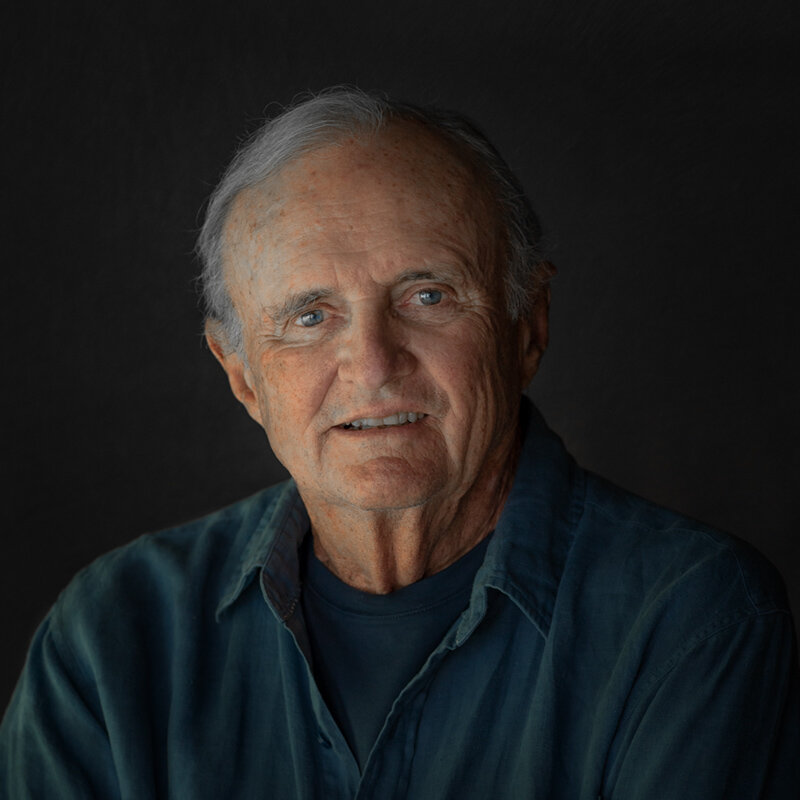My father died a bad death. My mother died a good death. Dad, blind from macular degeneration, bedridden with an untreated hip fracture and incoherent from dementia, spent the last four of his 97 years in a nursing home. At 88, coherent and her pain well-controlled by oral morphine, Mother died quickly and peacefully two weeks after a widespread abdominal malignancy was discovered. Her death, untainted by futile resuscitative efforts, occurred at her home with hospice care and my sister and I at her bedside. If Dad’s physicians and I had followed the advice offered in At Peace:Choosing a Good Death After a Long Life by Samuel Harrington MD, his passing could have occurred years before it did and would have been as peaceful a conclusion to his remarkable life just as my mother’s merciful passing was to her’s.
Samuel Harrington, MD
Photo by Danielle Libine
In At Peace, Dr. Harrington, a graduate of Harvard College and the University of Wisconsin Medical School, presents a wise and compelling strategy for making end-of-life decisions confronting us all. He provides his readers, both patients, providers and family members, advice about creating a strategy that will result in a more comfortable and humane death with minimal suffering and not prolonged by detrimental medical interventions. As he says, his book “is not about making the end of life less bad. It is not about extending life. It is not even about extending “high quality” life. It is about avoiding a painful dying process and futile medical care.”
In critiquing a healthcare system designed to encourage the excessive treatment of patients who are in the latter stages of life, Dr. Harrington asks his audience “How do you want to die? Do you want to suffer? Do you want your last conscious sensations to be the chest compressions of an emergency medical technician (EMT) separating your sternum from your ribs?” To answer the questions he poses, Dr. Harrington relies on his 40 years of practice as a gastroenterologist and careful research in addition to his experience with the death of his own father. In clear concise language, he challenges the value to the elderly of preventive care measures such as annual physical exams and periodic colonoscopies.
He outlines steps that can be taken to avoid a “medicalized death,” characterized by what he calls “the state of a semi-conscious patient in an ICU or nursing home who is subjected to medical treatments beyond their direct wishes or beyond common sense.” He defends his argument against aggressive interventions by taking a realistic look at the physical and mental impairments one is likely to encounter after age 75. He then maps out the trajectory of chronic diseases responsible for the deaths of 90 percent of elderly patients and shows the predictive failure of their treatments.
With a good death as a goal for those in latter stages of life, he explores the ethics and legalities of the voluntary refusal of nutrition and hydration. He stresses the importance of advanced directives that include Do No Resuscitate Orders, living wills, and the appointment of healthcare representatives. He devotes an entire chapter to hospice care, identifying it as the “best protection from CPR and over treatment.” With the compassionate voice of a seasoned physician, Dr. Harrington offers advice to those in the later stages of life about how to manage their pain, how to have the “difficult conversation” with a loved one concerning end-of-life wishes, and how to formulate an exit strategy after creating a vision of one’s death.
“Unburden your family,” he writes. “Share with them the peace of a decision to stop fighting. Avoid magical thinking and the inevitable failure of perpetually soldiering on.”
At Peace: Choosing a Good Death After a Long Life is a book that should be studied by students preparing themselves for careers in medicine, by those taking care of aging patients, by family members who don’t want their loved ones to suffer, and by everyone who desires for their life to end in peace with a good death.
—Daly Walker
Photo by Sally Walker
Daly Walker is a retired surgeon. His fiction has appeared in The Sewanee Review, The Louisville Review, The Southampton Review, Catamaran Literary Reader, The Saturday Evening Post and The Atlantic Monthly and been shortlisted for Best American Short Stories, a Pushcart Prize, and an O’Henry award. His book Surgeon Stories was published by Fleur-de-lis Press; a second collection, The Doctor's Dilemma, was recently published. He divides his time between Boca Grande, Florida and Quechee, Vermont and teaches a fiction writer’s workshop at Dartmouth College in Osher@Dartmouth’s summer program. His story “Resuscitation” appears in the Fall 2020 Intima.



